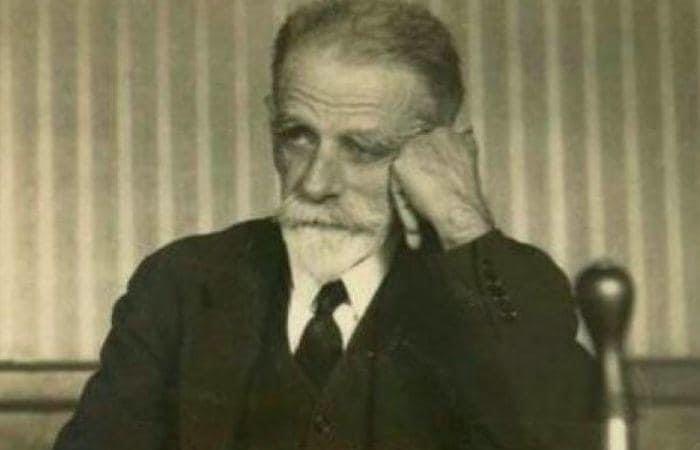General News
Meropi Kyriacou Honored as TNH Educator of the Year
NEW YORK – Meropi Kyriacou, the new Principal of The Cathedral School in Manhattan, was honored as The National Herald’s Educator of the Year.

FEBRUARY 26TH:
On this day in 1906, Nikos Hadjikyriakos-Ghikas (Nikos Ghika), the Greek artist, writer, and academic, was born in Athens. During Ghikas’ teen years, his family began recognizing the potential of his talents and arranged for him to study painting with the artist Parthenis. In 1923, he went to Paris to study French literature and aesthetics at the Sorbonne. He also studied ancient and Byzantine art as well as folk art – partially due to this adoration for the Greek landscape. Less than four years after arriving in Paris, he had his first exhibition at the Gallerie Percier. It has been said that Picasso himself noticed and commented on the works of the young Greek artist. He gained recognition as the leading Greek cubist and today Ghikas is celebrated as one of the most important modern Greek painters. His house has been converted into a museum and is being run by the Benaki Museum. In 2018, the British Museum hosted an exhibition which focused on the friendship of Ghika with artist John Craxton and the writer Patrick Leigh Fermor. His works are featured in the National Gallery of Greece, Musée d’Art Moderne de la Ville de Paris, the Tate Gallery in London, and the Metropolitan Museum of Art in New York.
FEBRUARY 27TH:
On this day in 1943, Kostis Palamas, the Greek poet, author, theatre playwright, historian and literature critic, passed away. Born in Patras, Palamas became one of the most important individuals in the evolution of modern Greek literature. When he was 6 years-old, both of his parents died. He and his older brother were taken by his uncle who took care of them until 1875 in an “atmosphere of misery and sorrow” which greatly influenced Palamas’ psyche. He was educated at Mesolongion and in Athens and eventually became the central figure in the Demotic movement of the 1880s, which sought to shake off traditionalism and draw inspiration for a new literary and artistic style from the life and language of the people. Palamas became the founder of the ‘new school of Athens’ which condemned Romantic exuberance and reverted to a more restrained type of poetry. He was the first poet to express the national sufferings and aspirations of the Greeks, and with his lyricism, metrical variety, and robust language, he remolded a great deal of Greek history, mythology, and philosophy, fusing it with many western European and even Eastern ideas. His funeral in 1943 became a public show of defiance to the Nazi occupation authorities. To this day, Palamas is considered one of the most important Greek poets and one that has made a considerable contribution in the development and renewal of modern Greek poetry.
MARCH 1ST:
On this day in 1941, an earthquake occurred in Larissa around 6 AM leaving 40 people dead and thousands homeless. During the period 1941-1980 the region of Thessaly experienced a series of strong earthquakes, which caused damage to a large number of localities and to all its major towns. According to the New York Times article published the day after the March 1 quake, more than 19,000 were said to be homeless. The prefect at Larissa, in an appeal for help, telegraphed authorities in Athens that nearly two thirds of the city’s population was driven to the streets. The government sent several special relief trains to the city while troop detachments dug into the wreckage to rescue those trapped. Royal Air Force bombers carried heavy loads of medical and other supplies from Athens to the earthquake area. British rescuers were also engaged in the help efforts as well. Final reports stated that 10% of the city’s buildings had been completely destroyed and 60% were seriously damaged.
MARCH 3RD:
On this day in 1968, five foreign embassies, including the Greek embassy, as well as a U.S. Army officers club were subjected to bomb attacks in London, The Hague, and Turin during an unprecedented rash of violations of diplomatic sanctity in the brief time frame of a few hours. In The Hague, bombs exploded in the Greek, Portuguese, and Spanish embassies and Police raced to the U.S. embassy after an anonymous telephone caller warned it would be bombed as well. No casualties were reported among the staff of the three embassies, but six firemen and four policemen were taken to the hospital with injuries after the first two explosions. Police said the blasts at the Greek and Spanish embassies caused considerable damage. The Hague Police believed the bombing of the embassies were acts of protest against the governments of the countries involved.
NEW YORK – Meropi Kyriacou, the new Principal of The Cathedral School in Manhattan, was honored as The National Herald’s Educator of the Year.

MELBOURNE, Australia (AP) — More than 100 long-finned pilot whales that beached on the western Australian coast Thursday have returned to sea, while 29 died on the shore, officials said.
Some of us await the day we retire with greater impatience, others with less.
Washington, DC – A special concert by Mario Frangoulis’ launched the Golden Jubilee Weekend celebrations for the American Hellenic Institute (AHI) at the famed Warner Theater in Washington, DC on April 12.
LORAIN, OH – Fr. Michael Gulgas, 67 of Amherst, fell asleep in the Lord, on the mid-Lenten celebration of the Holy Cross in St.